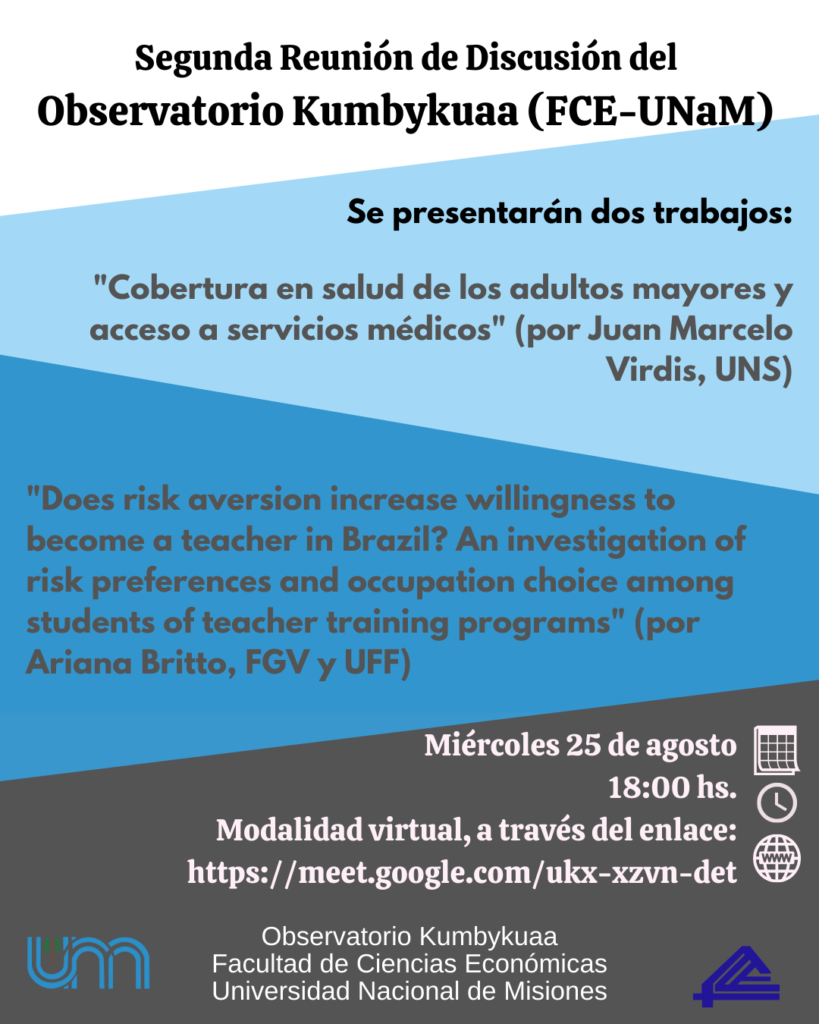Los invitamos a participar de la segunda Reunión de Discusión del Observatorio Kumbykuaa (FCE-UNaM) que tendrá lugar el próximo miércoles 25 de agosto a las 18 hs (modalidad virtual).
Datos de conexión: https://meet.google.com/ukx-xzvn-det
En este encuentro se presentarán dos trabajos, según se detalla a continuación:
-«Cobertura en salud de los adultos mayores y acceso a servicios médicos» (por Juan Marcelo Virdis, UNS)
ABSTRACT. El PAMI es una Obra Social que brinda, entre otros servicios, cobertura en prestaciones médicas a los jubilados y pensionados del régimen nacional de previsión. En la actualidad, cuenta con 5.000.000 de afiliados aproximadamente. El objetivo de este trabajo es evaluar cual es el impacto de esta política en los niveles de cobertura en salud, y en el acceso a servicios médicos. Para cumplir con el objetivo, se utilizaron datos de la Encuesta Nacional de Factores de Riesgo (ENFR) correspondientes a los años 2005, 2013 y 2018. Asumiendo la edad jubilatoria como el momento en que las personas pueden acceder a una jubilación o pensión, y por ende, a la cobertura del PAMI, se estimaron regresiones discontinuas con el fin de medir cual es el cambio en las variables seleccionadas. Los resultados indican que se produce un salto significativo en la cobertura de servicios médicos a partir de la edad jubilatoria. Por otra parte, no han encontrado resultados concluyentes en cuanto al acceso a servicios médicos.
-«Does risk aversion increase willingness to become a teacher in Brazil? An investigation of risk preferences and occupation choice among students of teacher training programs» (por Ariana Britto, FGV y UFF)
ABSTRACT. In Brazil, most public school teachers work within educational systems that make use of lagged compensation contracts. Under such employment contracts, teachers’ salaries depend essentially on their years of experience and level of qualification. Proposals that aim to reform teacher compensation, recruitment and retention have long considered the use of merit-based compensation systems. Teachers have generally not embraced these policies. One possible explanation for their objections is the fact that these mechanisms introduce uncertainty into teachers’ income. If teachers are relatively risk averse, as a vast literature on this topic suggests, a merit-based compensation mechanism could potentially reduce the attractiveness of a teaching career over the long term, and the satisfaction of this career in the short term. This paper contributes to the literature by investigating the role of risk preferences using four measures of risk and occupational choice among students of teacher training courses. Data were drawn from a survey administered to a representative sample of recent teaching graduates in Brazil. First results seems to suggest that teaching profession may attract individuals that might be, at least, more receptive to alternative compensation models. To address potential concern about endogeneity, we use instrumental variable estimation and find a negative correlation between individuals who choose a teaching career and willingness to take risks. This result applies only to the general risk measure. So far, these results should call attention to the importance of considering teachers’ preferences when designing new compensation systems for teachers.
Integrantes Observatorio Económico Kumbykuaa (FCE-UNaM)
Dr. Juan Antonio Dip, Facultad de Ciencias Económicas, UNaM y Observatorio Kumbykuaa (FCE-UNaM)
Dr. Fernando Antonio Ignacio González IIESS, UNS-CONICET y Observatorio Kumbykuaa (FCE-UNaM)
Lic. Tania SilvaFacultad de Ciencias Económicas, UNaM y Observatorio Kumbykuaa (FCE-UNaM)





